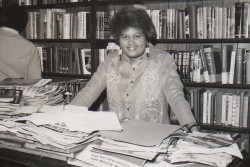The mammoth collection at the Mayme A. Clayton Library and Museum, located in Culver City, is due to one woman’s passion for preserving the history and cultural legacy of .
Mayme Clayton was born in Van Buren, Arkansas on Aug. 4, 1923. She grew up in a family where education and African-American accomplishment was emphasized.
After moving to California with her husband Andrew in 1946, she became a research librarian an UCLA’s law library.
In 1972 she left and became a co-owner of Universal Books before opening her own book store, Third World Ethnic books.
Clayton realized that she enjoyed collecting books more than selling them and as a result founded the nonprofit Western States Black Research Center. Clayton spent four decades salvaging any memento of black American history that she could find.
“The first time I went to the museum I was speechless. The history, the sheer amount of photographs, artwork and books. When I realized that one woman spent her life collecting these treasures. Well, it was overwhelming,” said Trinity Hopkins, a Culver City resident.
Though she had limited resources, she managed to assemble some of the most valuable and eclectic pieces of black American historical documents in the world.
The heirlooms include a handwritten letter written by Booker T. Washington, ex-slave Philllis Wheatley’s “Poems on Various Subjects, Religious and Mora” from 1773, actress Dorothy Dandridge with Martin Luther King, Jr. in a photograph and a film with musician Duke Ellington playing the devil.
“The generosity of the museum is priceless. Last year I was writing a paper for school. I needed to do a lot of research and the staff really helped me. They answered all my questions and more. I didn’t have to go anywhere else for information,” said Drew Winston, a UCLA student who wrote a research paper on African-American films.
The Mayme Agnew Clayton Collection of African-American History and Culture Collection are recognized as one of the largest and most academically substantial independently held assemblage of its kind in the world.
It is second in size and scope to the renowned Schomburg Collection at the New York City Public Library.
“The most significant thing about the artifacts in the Mayme Clayton is their potential to educate people of all races and ethnicities and shape their attitudes regarding the rich history and culture of a proud and oppressed people,” said Rebecca Rona-Tuttle, a member of the Culver City Martin Luther King celebration planning committee.
When Clayton started her efforts she housed everything in her study and in a garage behind her house.
“I wanted to be sure that children would know that black people have done great things and at the time I didn’t see anyone else saving the history,” Clayton said when asked what motivated her.
As the collection grew, storage and conservation became critical issues. The garage could not house all the items and the conditions were not adequate for proper conservation.
In 2004, Dr. Clayton’s son, Avery Clayton, became executive director of the predecessor to MCLM and began the task to find a permanent home.
Former Culver City mayor, Albert Vera, began talking with Mr. Clayton about moving the collection to Culver City.
In 2006 the Culver City Council and MCLM signed a lease for a de-commissioned Los Angeles County Courthouse.
The creation of the Mayme A. Clayton Library and Museum, a collection of more than 3,500,000 cultural treasures of historical significance, was a dream come true for Clayton.
Clayton’s legacy is one of subtle significance, without her, many of the treasures of the African-American cultural legacy might have been lost to time.
Dr. Clayton passed away in late 2006, shortly after her collection began the move into the Culver City facility. Her sons Avery, Lloyd and Renai, continue to move the collection forward.













